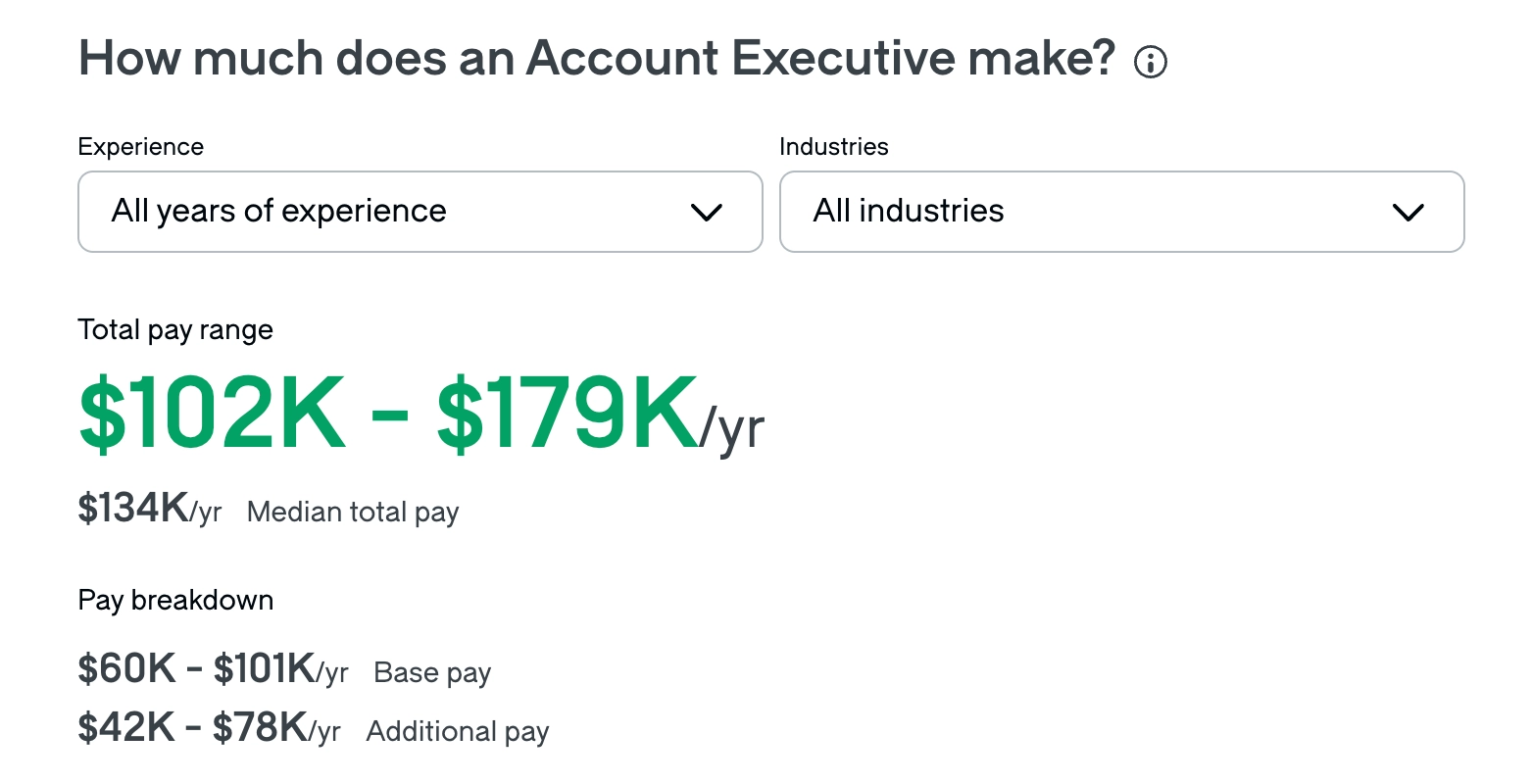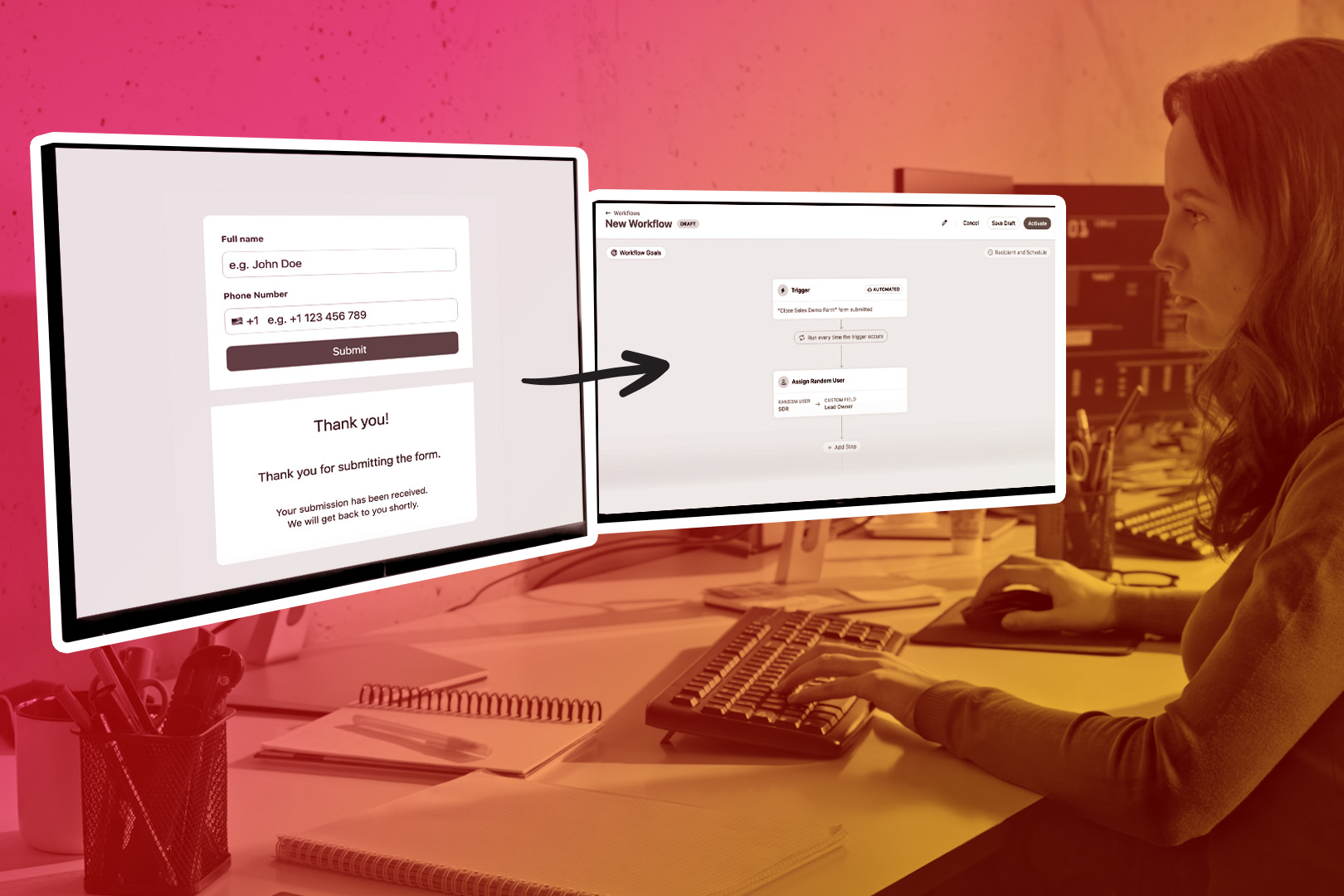In sales, there's no shortage of career paths, positions, and opportunities. With so many different titles and roles thrown around, you might wonder what an account executive does or how an AE differs from an SDR or account manager.
A sales account executive is a B2B sales professional who manages client accounts and drives new customer acquisition.
But what does their day-to-day look like? Who do they work with? And what skills do you need to become an account executive?
What is a Sales Account Executive?
In sales, a sales account executive manages and nurtures relationships with key accounts to maximize revenue and customer retention. They are typically employed by companies that offer products or services to other businesses (B2B) rather than individual consumers (B2C). Responsibilities vary from organization to organization, as we will discuss, but they are generally charged with acquiring new clients and customers.
Back in the day, the "executive" term was reserved for people who managed a team, so it might be confusing to learn they don't manage one. Instead, they serve as the primary company contact for existing and new clients.
What Does an Account Executive Do?
An account executive's duties can vary by industry and company. In general, they are in charge of building relationships with new clients and managing the existing ones. Think of them as the point of contact for internal company teams and clients.
Here’s a sales account executive job description highlighting key responsibilities and sales skills needed for success:

In general, sales account executives:
- Plan and coordinate account activity
- Generate sales opportunities by identifying potential customers
- Generate sales strategies based on data and trends
- Guide clients through the purchase process
- Regularly report account status
- Find, negotiate, and close business with new customers
- Retain current customers by strengthening client relationships
- Attend client meetings such as product demos and presentations, among others
- Bring value to clients through their solutions.
To be successful as an account executive, you need intellectual curiosity to study the accounts and create untapped opportunities, and excellent communication skills. You need to identify opportunities where others can't see them.
What Education Does a Sales Account Executive Need?
There is no defined route to land an account executive position, so its requirements aren't set in stone. Whichever route you choose, it is helpful to have a bachelor's degree or higher in communications, public relations, sales, marketing, or business administration.
You can also go the experience route, which many employers prefer. You'd be hard-pressed to find an employer that offers the account executive position as entry-level. You need a few years of professional experience—unless you join as a salesperson at a very early-stage startup that hasn't yet built a clearly defined sales process.
To get this experience, you can start in a more entry-level role in a B2B sales organization, such as an account coordinator, sales development representative (SDR), or business development representative (BDR). Other relevant roles for your resume might include telemarketing, staffing, and recruiting. After gaining a few years of experience and building contacts, you can more easily transition into an account executive role.
What Skills Does an Account Executive Need?
While experience with the right tech (such as CRM software and other sales outreach tools) is important, an account executive must be a people person. Soft sales skills such as empathy, problem-solving, and collaboration are key.
While the specific tools, techniques, and strategies you'll need will depend on the company you work for and the industry you serve, here are some other skills every account executive should possess:
- Communication skills
- Presentation skills
- Analytical skills
- Empathy
- Budget management
- Lead qualification
- Storytelling ability
- Team collaboration
- Microsoft Office (PowerPoint, Word, Excel)
- CRM (Salesforce, HubSpot, Close, etc)
- Social media outreach
- Contract negotiation
- Problem-solving
- Public relations
- Interpersonal skills
- Detail-orientation
- Time management
- Building client relationships
- Sales reporting
- Self-motivation
What is the Average Salary for an Account Executive?
According to Glassdoor, sales account executives in the United States earn a median total pay of about $134,000 annually, with base salaries typically ranging from $60,000 to $101,000 and additional compensation averaging $42,000 to $78,000.

But like with any other job, the amount you make as an account executive depends on your experience, qualifications, industry, and location. It can be as low as $35k or as high as $400k per year.
A Day in the Life of an Account Executive
Even the most detailed job description can’t fully capture a sales account executive’s daily responsibilities and fast-paced schedule. For instance, most don't say what type of software you will use and how you will spend an average day.
If job descriptions captured everything about an account executive's job, they would detail how action-packed their day is. It typically starts at 7:30 am and ends at 4:30 pm, with no two days being exactly the same.
Of course, the Account Executive's day varies for different professions in different organizations, industries, and countries. Nonetheless, here is a breakdown of what a "typical" day might look like:
7:30 am – Reading and responding to quick emails from customers, prospects, and workmates.
8:00 am – Standup meeting with the team. During this meeting, you and your team agree on the day's priorities and update each other on progress made in various projects. If there are any problems, this is the time to lay them out and solve them as a group.
8:30 am – Social selling. Open your social media platforms, such as Facebook and LinkedIn, and respond to your messages and comments or replies. Start conversations with prospects. Send out connection requests and personalized thank-you notes.
9:00 am – Research. You are expected to talk to a lot of people during the day. To be effective and orderly, take some time to research and learn more about the people you will speak to. Prioritize them if you must. You can even make notes on what you are going to talk about.
9:30 am – First break. Take some time off from your desk to stretch to be ready for the busy day ahead of you.
9:45 am – Your busy day starts from here—discovery calls, product demos, cold calling, and customizing proposals for different prospects.

11:30 am – Follow-up. During this time, follow up on any leads or deals you are working on to ensure they are still on track. Call, text, or email them to ensure they take the next step on time.
12:00 pm – Grab a lunch and relax.
1:00 pm – Check in with your manager to see if there are any immediate issues that you can help handle. You shouldn't do this every day, but even once in a while can make all the difference.
1:15 pm – Check your email and social media accounts again to see if there are any replies or messages to reply to. You must ensure timely communications.
2:00 pm – Hold discovery and demo calls and customize proposals and follow-up.
4:00 pm – Follow up. Call past customers, prospects, and partners and ask them if they are happy with your product or service. If they are, ask them to recommend you to friends and family who might need your product or service.
4:30 pm – Your day is done! Head home!
This is what a day in the life of an AE could look like, but if you land the position–which I hope you do–you will notice how much the days vary.
Account Manager vs. Account Executive: What's the Difference?
There can be some confusion surrounding the two sales professions because they tend to share several duties. Some businesses use the names interchangeably, and some hire the same sales professional for both jobs. However, this can only work for small businesses. Larger businesses need to clearly define the professions and roles to get the most out of both.
The difference between an Account Manager and an Account Executive is in the roles they handle. The Account Manager is responsible for growing and maintaining current client accounts, while the Account Executive is responsible for acquiring new accounts and managing the current ones.
Considering Becoming a Sales Account Executive?
A sales career is fulfilling and exciting, and being an account executive is a key step in that journey, especially if you're in B2B sales.










.jpg)

